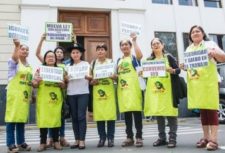Disclaimer: This article is more than 12 years old, and may not include the most up-to-date information or statistics. Please verify information with more recent sources as needed, and if you have any questions contact our Press Office.
16 June 2011
A new international convention to protect tens of millions of domestic workers across the world has been agreed by an overwhelming majority of governments, trade unions and employers organisations.
International Labour Organization (ILO) Convention 189 on Decent Work for Domestic Workers was backed by 83 per cent of voters in Geneva on 16 June 2011 and will for the first time establish minimum employment standards for an estimated 50 to100 million domestic workers worldwide.
The new convention, which has been fought for by domestic workers for over 50 years and negotiated for the past two years, will ensure that domestic workers are no longer excluded from national employment law protections. Once ratified by individual counties, domestic workers will be legally entitled to weekly days off, limits to hours of work and a minimum wage.
The convention has been created to combat a wide range of abuses faced by domestic workers. These include being made to work up to 100 hours a week without rest, the non-payment of wages, restriction of movement, physical and sexual abuse, and even slavery. The convention also addresses the special needs of migrant domestic workers and the 15.5 million child domestic workers estimated to be working across the world.
The specific details of text of the convention were negotiated over two weeks at the International Labour Conference in Geneva this June. Individual articles deal with specific issues experienced by domestic workers. These include, article 10 on working time, article 17 on the regulation of private employment agencies (a source of many violations) and article 4 relating to child domestic workers.
Audrey Guichon, Anti-Slavery International’s Domestic Worker Programme Co-ordinator, said: “This is a historic moment. After many years of refusing to recognise domestic workers as real workers, the international community has finally accepted that domestic workers are worthy of protection just like everyone else.”
The UK government was one of just eight countries that abstained from voting in favour of the convention. The other countries were Sudan, Malaysia, El Salvador, Panama, Singapore, Czech Republic and Thailand. Swaziland was the only government to vote against convention.
Audrey Guichon said: “The UK should be ashamed that it is the only democracy in a very isolated group of nations, which includes Sudan, not supporting what is now an internationally accepted minimum standard of protection of domestic workers’ rights. Its decision not to vote in favour of the convention sends a worrying signal that domestic workers in the UK will face increasing difficulties in the future.”
For further information contact Paul Donohoe, Anti-Slavery International Press Officer, (English) on +44 20 7501 8934 or p.donohoe@antislavery.org
Notes for editors
1. The coalition of charities and Trade Unions working together to help create this convention includes Anti-Slavery International, Christian Aid, Children Unite, Justice for Domestic Workers, Kalayaan, TUC and Unite.
2. Anti-Slavery International is the world’s oldest human rights organisation and campaigns for the eradication of slavery, exposing current cases, supporting local organisations to release the minimum 12.3 million people in slavery, and the implementation of international laws against slavery. www.antislavery.org





